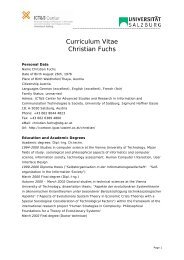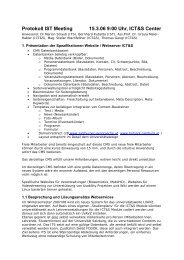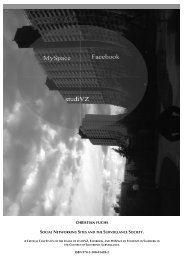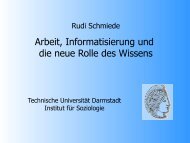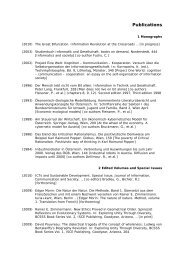ICTS AND SOCIETY: THE SALZBURG APPROACH - ICT&S
ICTS AND SOCIETY: THE SALZBURG APPROACH - ICT&S
ICTS AND SOCIETY: THE SALZBURG APPROACH - ICT&S
Create successful ePaper yourself
Turn your PDF publications into a flip-book with our unique Google optimized e-Paper software.
ICTs and Society: The Salzburg Approach<br />
gitimacies of each value system can be brought together in a critically systemic<br />
discourse.” This may include that “Such a constellation may legitimately eliminate<br />
elements of otherness that have been identified as illegitimate” (Gregory 1996, 55).<br />
This is what we would like to extend to the realm of social-science and technology<br />
methods, beyond the border of system theory methods. On a metalevel, a methodology<br />
can be built that is a system of methods that, in turn, originate from different<br />
theoretical angles but undergo a process of critical reconsideration in order to<br />
suit a common methodological umbrella. The underlying way of thinking is a dialectical<br />
account of unity and diversity or identity and difference. Ways of thinking can<br />
be seen as ways of considering how to relate identity and difference (see Hofkirchner<br />
2004). The dialectical one – which is opposed to reductionism, projectivism and<br />
dichotomism as well – establishes identity in line with the difference; it integrates<br />
both sides of the difference (yielding unity) and it differentiates identity (yielding diversity);<br />
it is a way of thinking that is based upon integration and differentiation; it<br />
is opposed to both unification and dissociation and yields unity and diversity in<br />
one – unity in diversity and diversity in unity. As Edgar Morin puts it: “It means understanding<br />
disjunctive, reductive thought by exercising thought that distinguishes<br />
and connects. It does not mean giving up knowledge of the parts for knowledge of<br />
the whole, or giving up analysis for synthesis, it means conjugating them. This is<br />
the challenge of complexity which ineluctably confronts us as our planetary era advances<br />
and evolves” (1999b, 19).<br />
Thus, a system methodology is capable of doing justice to other methods and including<br />
them as well.<br />
Methods and theory are closely connected. Methods is about how to approach the<br />
object of study, theory is about understanding the object of study. Understanding<br />
depends on the approach you take, however, the approach depends on the understanding.<br />
That is to say, if you approach an object in different ways, the resulting<br />
understanding will accordingly differ; and, on the other hand, a certain understanding<br />
precludes certain methods. So there is a dialectical relationship between scope<br />
and tools that has to be taken into account.<br />
Regarding the theory–method relation, we propose a research programme for a<br />
framework of how – from a very particular level (the level of subfields of ICT&S Research)<br />
to a very universal level – theories of different range can be related so as<br />
to build an architecture of presuppositions that are methodologically meaningful<br />
(see Fig. 10). Research in ICTs and society – aiming at producing knowledge about<br />
Information Society and information technology – implies methodologically the application<br />
of a certain amount of knowledge about society and of a certain amount of<br />
knowledge about technology; to go on, knowledge about society implies knowledge<br />
about real-world entities society is just one instantiation of; finally, knowledge about<br />
such real-world entities implies knowledge about reality in general; and, to follow<br />
another strain of thought, knowledge about technology, in turn, implies knowledge<br />
about society and, in addition, implies knowledge about information processes;<br />
knowledge about information processes, in turn, implies knowledge about real-world<br />
entities and, in addition, knowledge about reality in general. The essential point to<br />
grasp here is that, willingly or not, being aware of this or not, findings on one level<br />
of abstraction are based upon assumptions on higher levels of abstraction; assump-<br />
Hofkirchner | Fuchs | Raffl | Schafranek | Sandoval | Bichler 38



